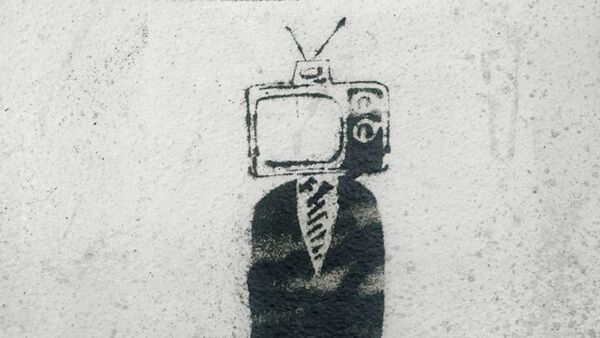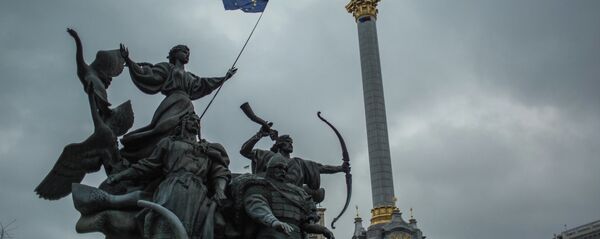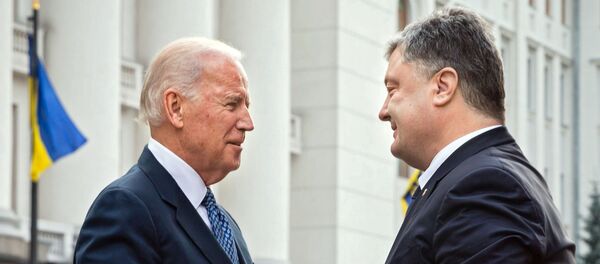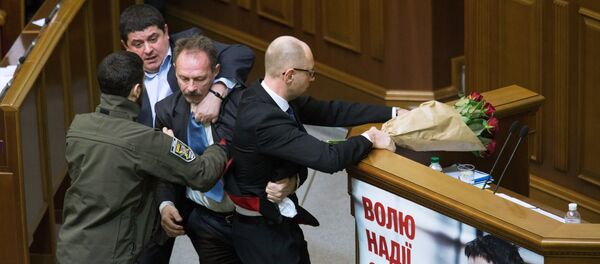On December 28, a statement on the new media law on the president's website explained that "today, in conditions of hybrid war, [approving such a law] is an issue of the survival of our country, an issue of efficient resistance to the aggressor-country's propaganda work aimed against Ukraine."
The statement also graciously noted that "unprejudiced coverage" of the situation in Ukraine "should be the criterion of efficient information policy. We shouldn't copy the propaganda methods of the aggressor-country. On the contrary, our journalists should tell the truth about the war in Ukraine and gain trust this way."
For his part, Minister of Information Policy Yuri Stets, also quoted in the press release, assured the president that the reform of foreign broadcasting would be completed in two months. "The world should know Ukraine not only as a state which has problems, but also as a country with a rich history and culture, a good investment climate, great tourist opportunities and kind people."
The law on foreign broadcasting, signed by Poroshenko on December 28, was approved by Ukraine's lawmakers on December 8, the day US Vice President Joe Biden stopped by for a visit in Kiev. The text of the document explains that "the system of state foreign broadcasting of Ukraine will be formed on the basis of the state enterprise 'Multimedia Foreign Broadcasting Platform of Ukraine' and the 'National News Agency of Ukraine' (Ukrinform)."
The document also provides for the creation of the 'Ukraine Tomorrow' TV and radio foreign broadcasting company, which will be subordinated to the Ministry of Information Policy.
So what does Kiev's new foreign broadcasting law really entail, and will Ukraine Tomorrow really be able to give Russian foreign broadcasters like Sputnik and RT a run for their money?
Commenting on the new law for independent Russian newspaper Svobodnaya Pressa, Vladimir Kornilov, Ukraine expert and director of the Center for Eurasian Studies, explained that "the role of television in propaganda is now very strong. It's worth recalling that in the Donbass, soldiers are fighting first and foremost to gain control of television towers. That alone tells us something, doesn't it?"
As for the Ukrainian president's commentary that broadcasting should be restored in the Donbass, and whether this will be able to influence local residents' worldview, Kornilov emphasized that "in free competition with Russian channels, the Ukrainian ones stand no chance. Therefore, Poroshenko's goal will be not only to restore the broadcast of Ukrainian channels, but to ban the Russian ones."
"In the place of the Donetsk People's Republic's leaders, I would suggest an experiment: to allow the broadcast of Russian channels into the regions which border the Donbass – Kharkiv, Dnipropetrovsk, Zaporizhia, and in return allow for the broadcast of Ukrainian television in Donbass. I can assure you – Kiev would angrily reject such an idea, because it understands what the consequences would be."
Asked whether the new Ukraine Tomorrow project will be able to successfully compete with its Russian foreigner broadcaster counterparts, the analyst noted that "one cannot build a 'tomorrow', while ignoring today. In Ukraine this is something which is always overlooked. They have already forgotten that the foreign broadcaster Ukraine Today was founded last August. And what did it achieve in half a year? Zilch. So, instead of attempting to put the already existing project in order, Ukraine has started a new song and dance. And in a year and a half's time they will be creating the channel 'Ukraine After Tomorrow'."
Asked whether Western readers could find anything of interest in the new 'Ukraine Tomorrow' project, the analyst admitted that he has his doubts.
"Following the victory of the Euromaidan, in addition to the famous Hromadske.TV, Ukraine launched the English-language project Ukraine Today, aimed at acquainting the English-speaking audience with Ukraine," he noted. "Just for fun, I decided to watch one of the first subjects that the channel ran. When the presenter suggested that Ukraine has struggled for freedom and independence for over 15 centuries, I decided that I could not stand this crazy scientific experiment anymore. The same day, I spoke to an Italian politician friend of mine about what I had seen. 'It turns out that they are the same age as us –the Romans,' my friend laughed."
Byshok suggested that ultimately, "the new Ukrainian channel can find interest among Western audiences only if, like RT, it will allow 'the other side' a chance to speak. Whether its creators will agree to such a thing is another story."






